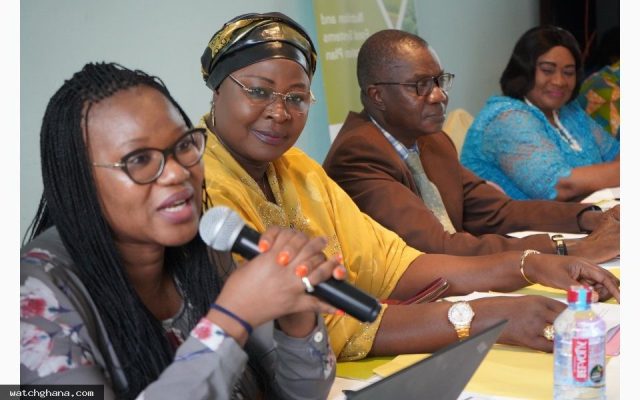The Ghana school feeding programme in collaboration with African Union Development Agency(AUDA)- NEPAD has one of the strongest monitory system that has taken the lead in developing a modern verification through innovative digital tool, for home grown school feeding programme, with the support of World Food Programme (WFP) to correct all delusion and negative human interruptions thereby reducing hunger and poverty .
School feeding programmes play a crucial role in addressing malnutrition, improving children’s health and educational outcomes.
The AU/NEPAD team was in Ghana to learn about Ghana’s best practices in the management and implementation of the home grown school feeding and also share their best experience with Ghana. It was held at Alisa hotel in Accra, on Wednesday December 11, 2024.
AUDA-NEPAD’s vision for the Home Grown School Feeding is aimed at fully utilizing the produce of local farmers in Africa; improve nutrition among children; ensure food security and food safety as well as reduce poverty among smallholder farmers.
According to the NEPAD Agency’s Nutrition Programme Director, Ms. Kefilwe Moalosi Align with the implementation of the Home Grown School Feeding being Advocated by NEPAD.
Kefilwe Moalosi Addressing the participants and Stakeholder Consultative Workshop at Alisa to review the Development, School Feeding Programme Implementation Guidelines and Monitoring Tool, and also meant to reduce hunger, to help increase attendance and enrollment, reduce school dropout rate, and ensure that children learn and perform better in school, she noted.
She spoke during the school feeding stakeholders strategic meeting themed: “Encouraging state driven implementation and best practices for school feeding towards local agricultural value chain, community engagement and economic development.”
She called on African leaders to emulate Ghana for transitioning school feeding programme from federal government led to state Government ownership
Moalosi Acknowledge the management team of the Ghana School Feeding Programme for leading the charge to create a strong link between caterers and the local farmers in the various communities engagement and economic development.
A welcome address by Mad. Paulina Abbey Director, Food safety Desk at the ministry of food and Agriculture Accra, noted that her ministry has been focused on improving the quality of school meals in the country” One way of improving the school meals is by using a tool that facilitates the process of planning nutritious meals because planning a meal menu is often a difficult task and that requires expertise,” Abbey said.
The keynote address by Dr. Clement Adjorlolo, Phd, Principal Programme Officer, Agriculture and Rural Transformation at AUDA -NEPAD, delivered inspiring remarks on achieving objectives of school programs.
Adjorlolo was speaking at an event organized by AUDA-NEPAD and the African Union Commission (AUC), in collaboration with ministry of Agriculture Ghana among other partners and made known of the objectives
that includes.
Incubating high-impact projects that demonstrate proof-of-concept to translate the AU’s continental strategic development frameworks into national development priorities
Enhancing knowledge sharing among countries, supported by evidence-based feedback on best practices for regional integration
Brokering partnerships and resource mobilisation for the implementation of the First Ten-Year Implementation Plan of Agenda 2063.
According to Adjorlolo “Together, we can build a brighter future for generations to come. We will only reach our goal to zero hunger, if we all walk together– we have to run together towards our goal!With these remarks, once again, thank you very much Ghana government for collaborating with AUDA-NEPAD to domesticate the continental school feeding guidelines through the engagement of school feeding implementers , especially at community level to contribute to the food and nutrition security outcomes.” he stated.
Ghana has shown leadership and seriousness in the school feeding implementation in Africa, and still continues to show clear signs and commitment to reaching more school children. Ms
The data compiled by the AU in 2019 indicates that the figure drawn from 51 countries representing a massive increase from 38.4 million in 2013, She explained
Many African countries now seek technical assistance in designing, implementing, managing, monitoring, and evaluating HGSF programmes. Additionally, more and more countries are seeking to improve the quality of the meals in terms of nutrition and increase the scale of their HGSF programmes.
“This AUDA-NEPAD HGSF Guideline document is therefore meant to fill this gap and provide general direction as well as technical guidance to AU Member States who wish to establish or strengthen their HGSF programmes to create a genuinely multi-sectoral, win-win scenario,” he added.
The Ghana School Feeding Program,currently provides people in public primary schools with one hot nutritious meal per each school going day using locally grown foodstuffs.
SOURCE: PRISCILLA NDEDE
Send your news stories to newsghana101@gmail.com
Follow News Ghana on Google News

















